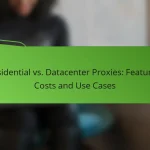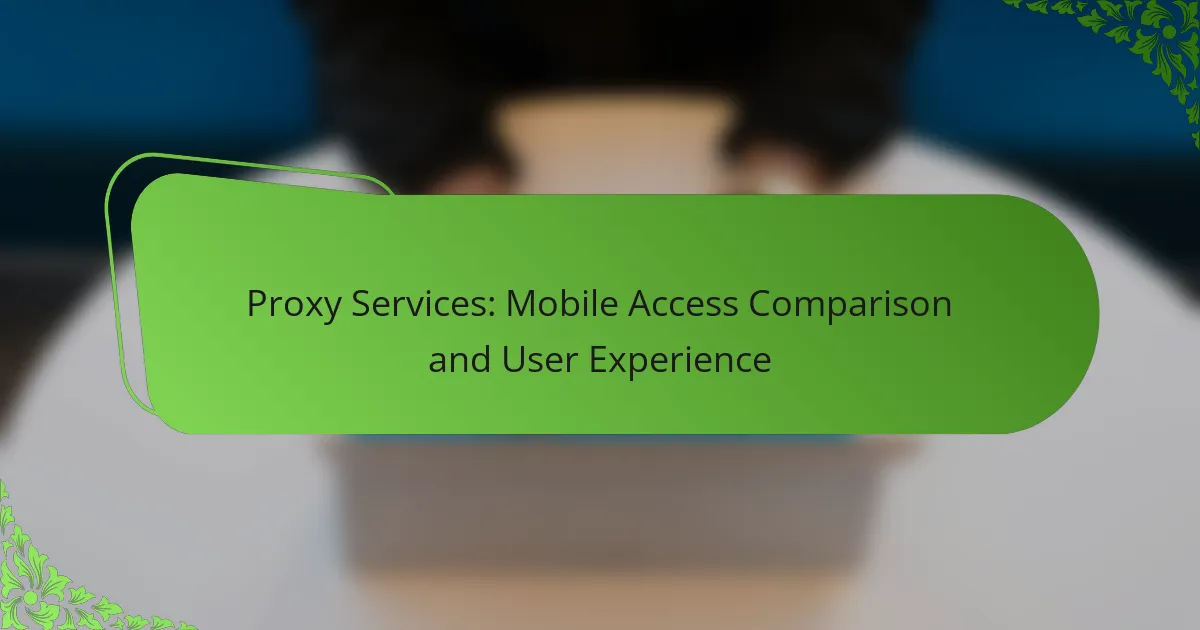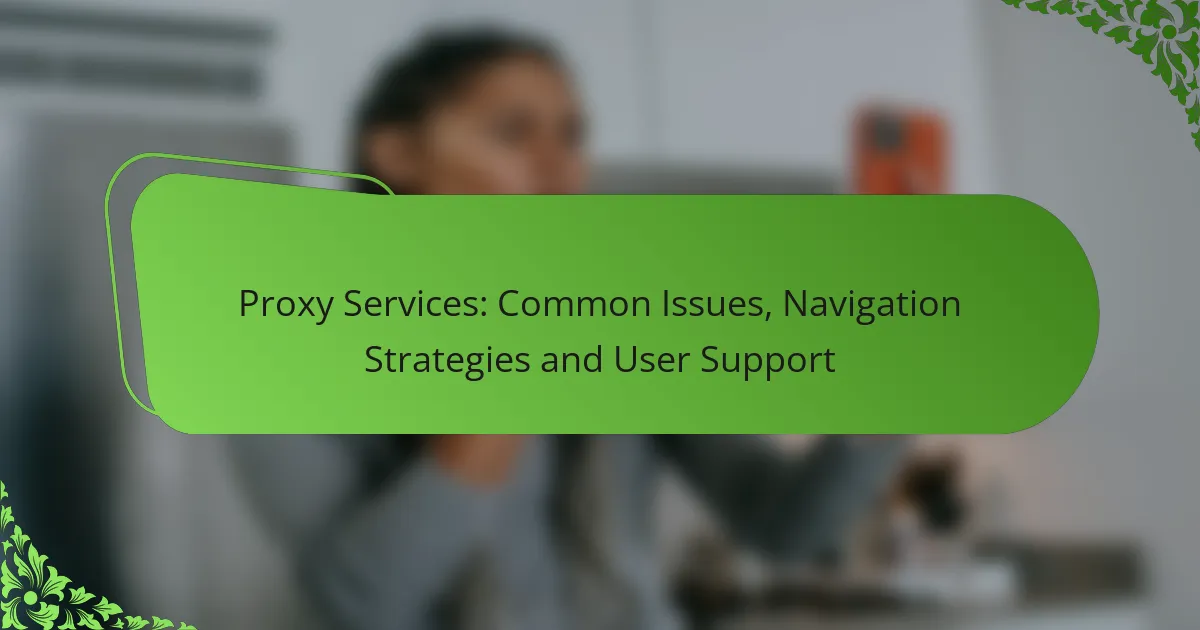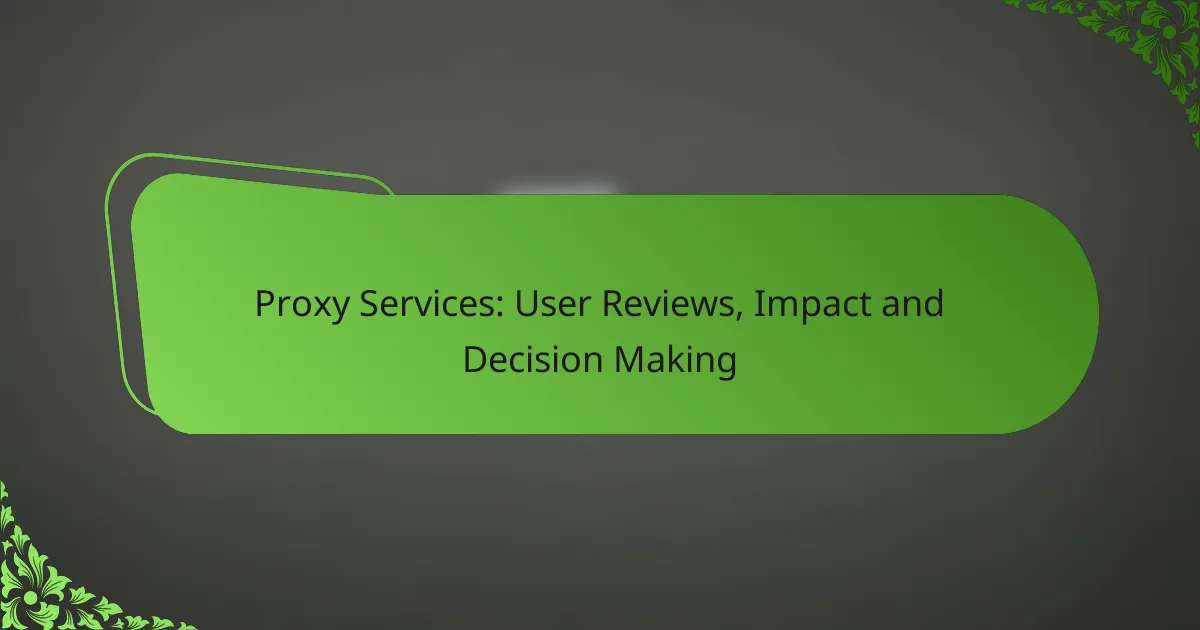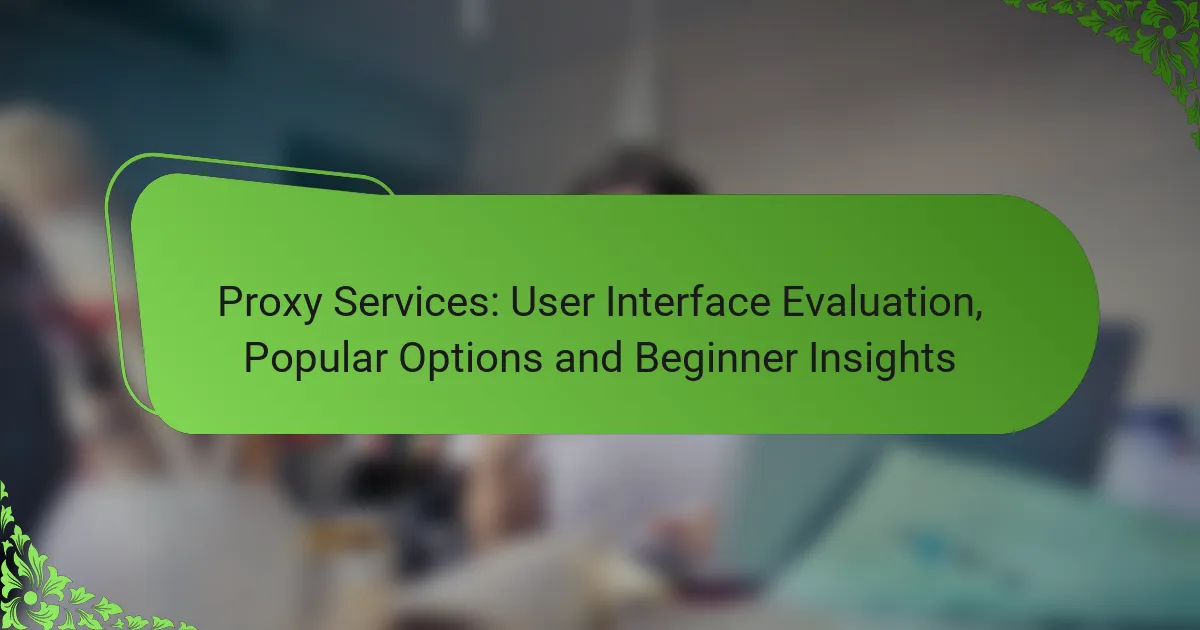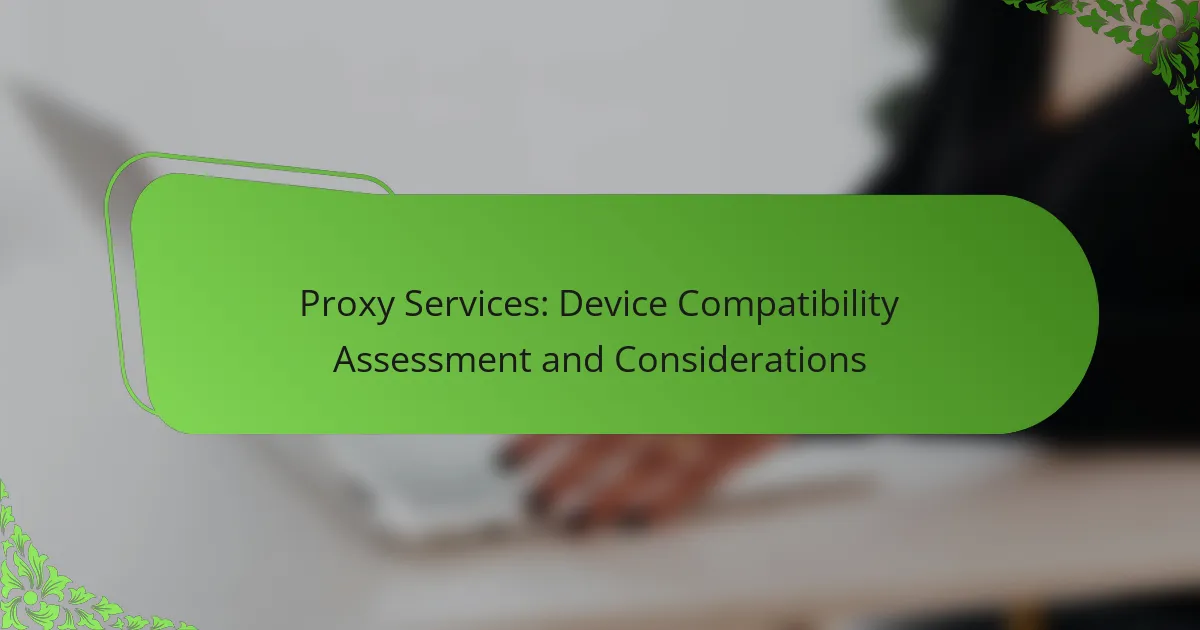Proxy services designed for mobile access are essential for users seeking reliable connections and enhanced online privacy. These services not only allow users to bypass geo-restrictions but also improve browsing speed and overall user experience on mobile devices. With various pricing models available, individuals can select a plan that best suits their needs while enjoying the benefits of anonymity and unrestricted access to content.
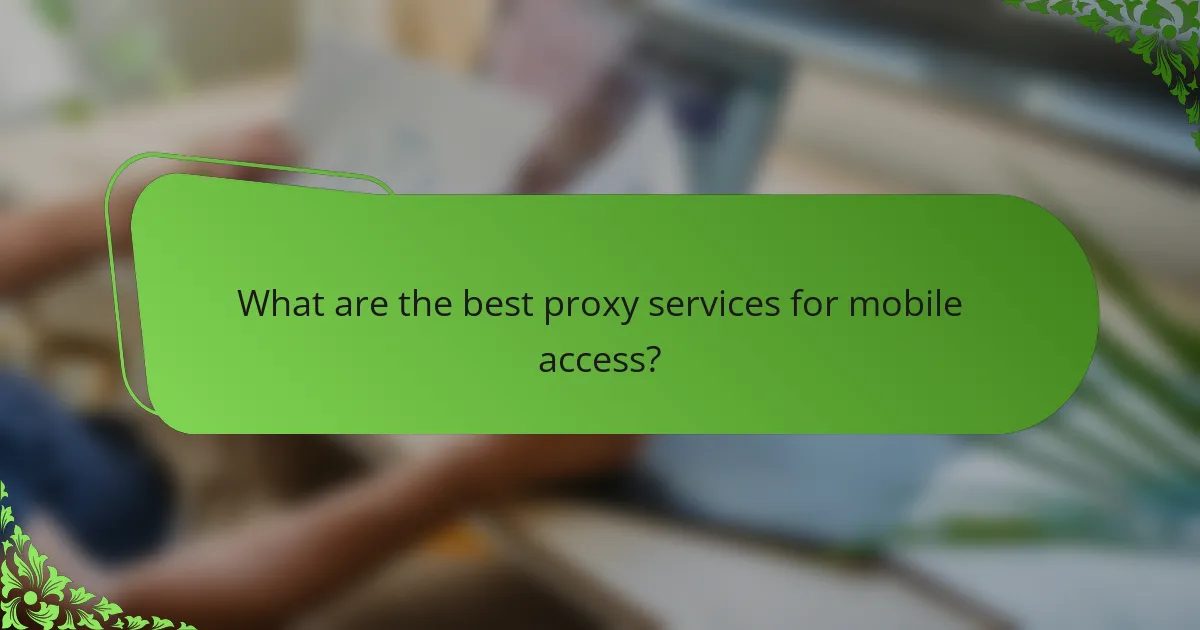
What are the best proxy services for mobile access?
The best proxy services for mobile access provide reliable connections, extensive IP pools, and user-friendly interfaces. These services enable users to bypass geo-restrictions and maintain anonymity while browsing on mobile devices.
Bright Data mobile proxy service
Bright Data offers a robust mobile proxy service with a vast network of residential IPs, allowing users to access content from various locations seamlessly. Its mobile proxies are particularly effective for web scraping and ad verification, providing high success rates and low latency.
When using Bright Data, consider the pricing structure, which is typically based on data usage. Users can expect to pay in the range of USD 15 to USD 30 per GB, depending on the plan chosen. This flexibility allows businesses to scale their usage according to their needs.
Smartproxy mobile proxy service
Smartproxy provides an easy-to-use mobile proxy service that features over 40 million IPs worldwide. This service is ideal for tasks like social media management and market research, as it allows users to rotate IPs effortlessly to avoid detection.
Smartproxy’s pricing is competitive, with plans starting around USD 75 per month for 5 GB of data. Users should be mindful of the data limits and choose a plan that aligns with their expected usage to avoid overage fees.
Oxylabs mobile proxy service
Oxylabs is known for its high-quality mobile proxy service, which offers a large pool of residential IPs and excellent performance. It is particularly suited for businesses that require reliable access for data collection and competitive analysis.
With Oxylabs, users can expect to pay around USD 180 for 20 GB of data, which is on the higher end of the market. However, the service’s reliability and speed often justify the cost for enterprises that prioritize performance.
GeoSurf mobile proxy service
GeoSurf specializes in providing mobile proxies with a focus on security and anonymity. Its service is designed for users who need to access geo-restricted content while ensuring their identity remains protected.
GeoSurf’s pricing starts at approximately USD 300 per month for 38 GB of data. Users should evaluate their needs carefully, as the service is tailored more towards businesses that require extensive data access rather than casual users.
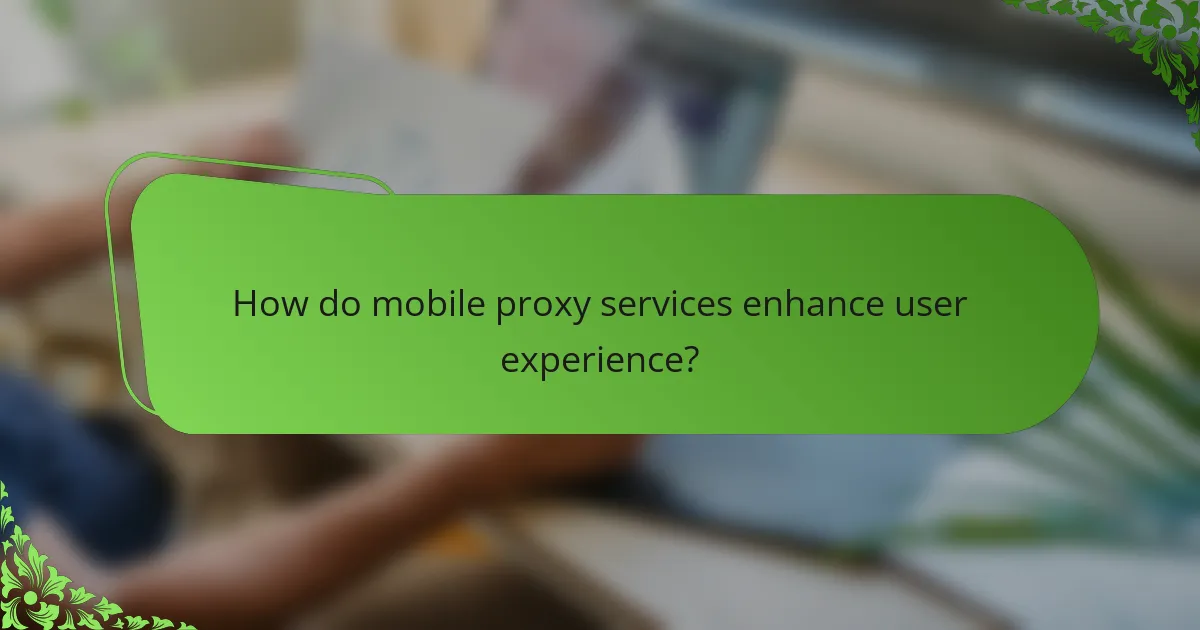
How do mobile proxy services enhance user experience?
Mobile proxy services significantly enhance user experience by providing faster browsing, enabling access to restricted content, and ensuring greater anonymity. These features cater to users seeking improved online performance and privacy while using mobile devices.
Improved browsing speed
Mobile proxy services can enhance browsing speed by routing traffic through optimized servers, reducing latency. Users often experience faster load times, especially when accessing content-heavy websites or applications.
To maximize speed benefits, choose a proxy provider with a robust infrastructure and servers located near your geographical area. This can lead to browsing speeds that are noticeably quicker than standard mobile connections.
Access to geo-restricted content
Mobile proxy services allow users to bypass geographical restrictions, granting access to content that may be unavailable in their region. This is particularly useful for streaming services, social media platforms, and websites that enforce location-based access.
For example, a user in Europe can use a mobile proxy to access content exclusive to the US market. Ensure the proxy provider offers a variety of server locations to maximize access to different regions.
Increased anonymity and privacy
Using mobile proxy services enhances user anonymity by masking the original IP address, making online activities harder to trace. This is crucial for users concerned about privacy and security while browsing.
To maintain a high level of privacy, select a proxy service that does not log user activity and employs strong encryption protocols. This helps protect sensitive information from potential threats, especially on public Wi-Fi networks.
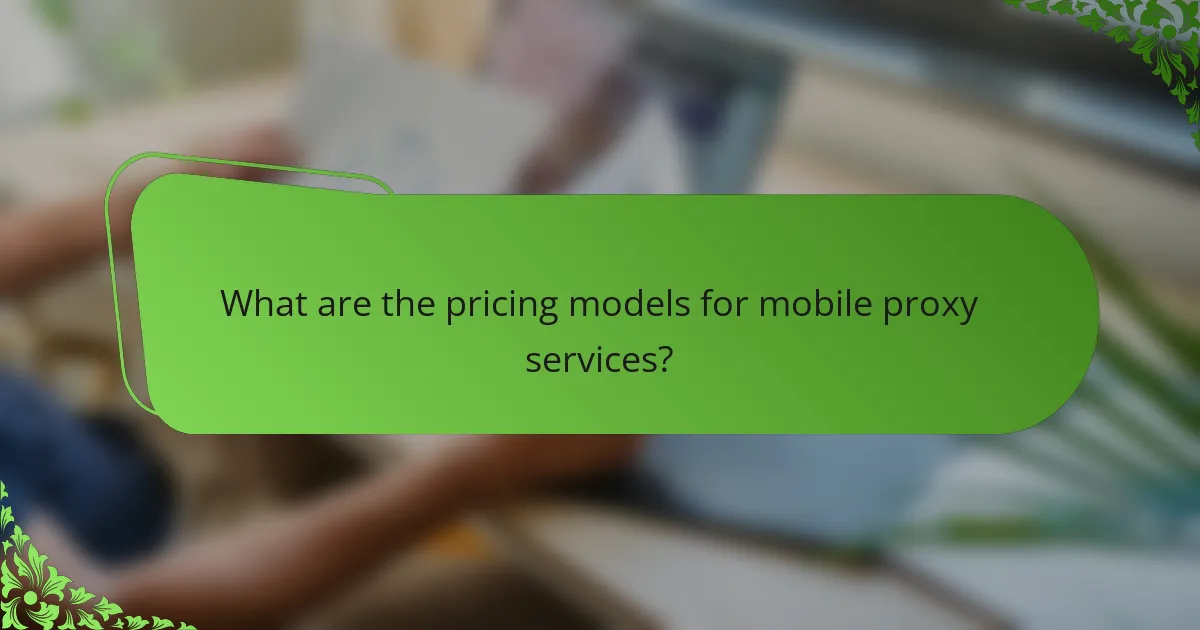
What are the pricing models for mobile proxy services?
Mobile proxy services typically offer several pricing models, allowing users to choose based on their needs and usage patterns. The most common models include subscription-based pricing, pay-as-you-go pricing, and tiered pricing plans, each with distinct advantages and considerations.
Subscription-based pricing
Subscription-based pricing involves paying a fixed monthly or annual fee for access to mobile proxy services. This model is ideal for users with consistent and predictable usage, as it often provides unlimited data and access to a range of features.
Commonly, subscription plans can range from around $10 to $100 per month, depending on the number of IPs, bandwidth, and additional features included. Users should assess their expected usage to determine if a subscription plan offers better value compared to other models.
Pay-as-you-go pricing
Pay-as-you-go pricing allows users to pay only for the data they consume, making it suitable for those with irregular or low usage. This model typically charges based on data volume, such as per gigabyte or per session.
While this can be cost-effective for infrequent users, costs can accumulate quickly for heavy users. It’s essential to monitor usage closely to avoid unexpected charges, which can sometimes exceed the cost of a subscription plan.
Tiered pricing plans
Tiered pricing plans offer different levels of service at varying price points, catering to diverse user needs. Each tier usually includes a specific amount of data, speed, and features, allowing users to select a plan that best fits their requirements.
For example, a basic tier might start at around $20 per month for limited data, while a premium tier could exceed $100 for higher data limits and faster speeds. Users should evaluate their needs and potential growth to choose a tier that balances cost and performance effectively.
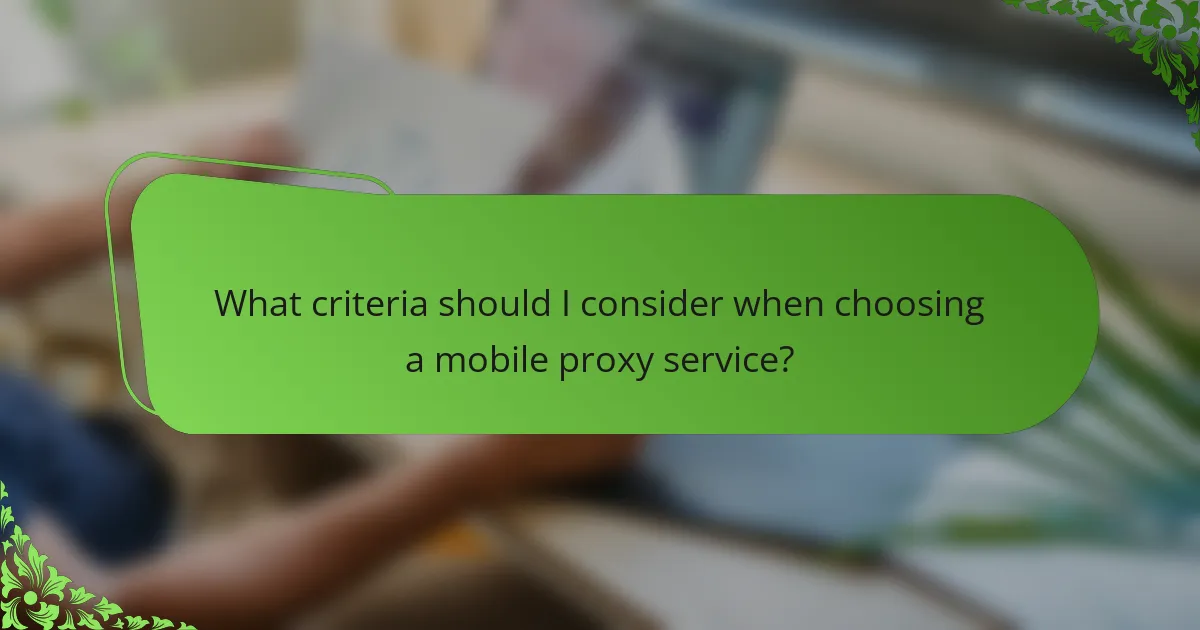
What criteria should I consider when choosing a mobile proxy service?
When selecting a mobile proxy service, focus on connection speed, geolocation coverage, and customer support quality. These factors significantly impact your overall experience and effectiveness in utilizing the service for various tasks.
Connection speed and reliability
Connection speed is crucial for tasks like web scraping or streaming, where delays can hinder performance. Look for services that offer low latency, ideally in the low tens of milliseconds, to ensure smooth operation.
Reliability is equally important; choose a provider that guarantees uptime and consistent performance. A good proxy service should have a reputation for minimal downtime and stable connections, which can be verified through user reviews and service level agreements.
Geolocation coverage
Geolocation coverage refers to the range of locations from which the proxy service can provide IP addresses. A wider coverage allows you to access content restricted to specific regions, enhancing your ability to bypass geo-blocks.
When evaluating options, check if the service offers IPs from multiple countries and cities. This is particularly useful for businesses targeting international markets or individuals needing access to localized content.
Customer support quality
High-quality customer support can make a significant difference, especially if you encounter technical issues. Look for services that offer 24/7 support through various channels, such as live chat, email, or phone.
Additionally, consider the availability of resources like FAQs, tutorials, and community forums. These can help you troubleshoot common problems independently and enhance your overall experience with the service.
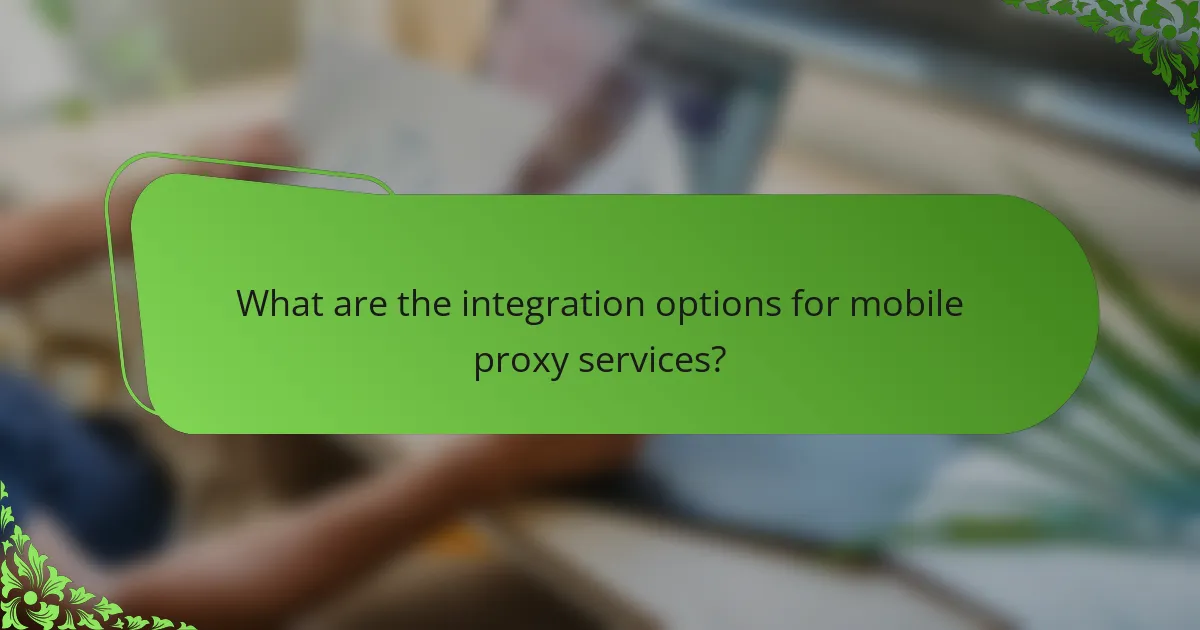
What are the integration options for mobile proxy services?
Mobile proxy services offer various integration options to enhance user experience and automate tasks. Key integration methods include API access, browser extensions, and compatibility with data scraping tools, each providing unique benefits and considerations for users.
API access for automation
API access allows users to automate interactions with mobile proxy services, making it easier to manage requests and responses programmatically. This integration is particularly useful for developers who need to scale their operations or perform repetitive tasks efficiently.
When using API access, consider factors like rate limits, authentication methods, and the availability of documentation. Many services offer RESTful APIs, which can be integrated into various programming environments, enabling seamless automation.
Browser extension compatibility
Browser extensions provide a user-friendly way to utilize mobile proxies directly within web browsers. These extensions often simplify the process of switching IP addresses and managing proxy settings without needing extensive technical knowledge.
When selecting a browser extension, ensure it supports your preferred browser and check for features like session management and user interface design. Popular browsers like Chrome and Firefox typically have a range of compatible extensions available.
Integration with data scraping tools
Mobile proxies can be integrated with data scraping tools to enhance the efficiency of data collection from websites. This integration helps bypass restrictions and reduces the risk of getting blocked while scraping data.
When choosing a data scraping tool, look for compatibility with mobile proxies and features that support rotating IP addresses. Tools like Scrapy or Octoparse often provide built-in support for proxy integration, making it easier to set up and execute scraping tasks.
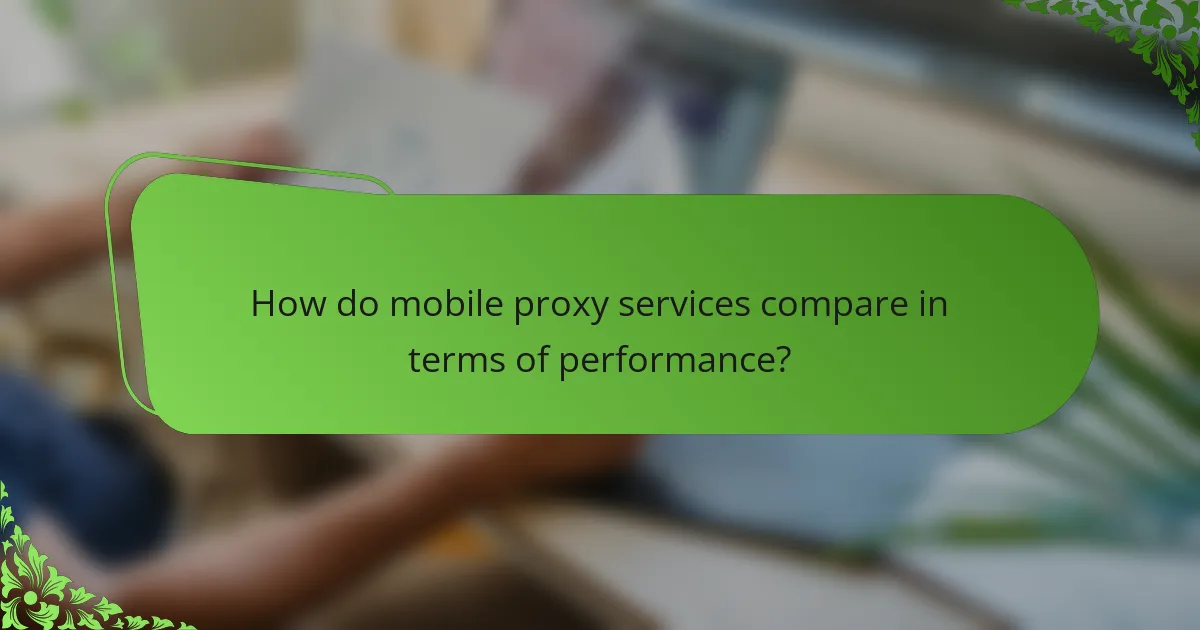
How do mobile proxy services compare in terms of performance?
Mobile proxy services vary significantly in performance, primarily influenced by factors like latency and uptime. Understanding these differences can help users select the best service for their specific needs.
Latency comparison
Latency is a critical factor in the performance of mobile proxy services, as it measures the delay before data transfer begins. Generally, mobile proxies can exhibit latency in the low tens of milliseconds to higher values, depending on the provider and network conditions.
When choosing a mobile proxy service, consider the geographical location of the proxy servers relative to your target audience. Proxies closer to the end-users typically result in lower latency, enhancing user experience and responsiveness.
Uptime statistics
Uptime is another essential performance metric for mobile proxy services, indicating the reliability of the connection. Most reputable providers aim for uptime percentages in the high nineties, typically ranging from 95% to 99.9%.
To ensure consistent access, look for services that offer uptime guarantees and transparent reporting on their performance. Regularly checking uptime statistics can help you avoid disruptions and select a provider that meets your operational needs effectively.
